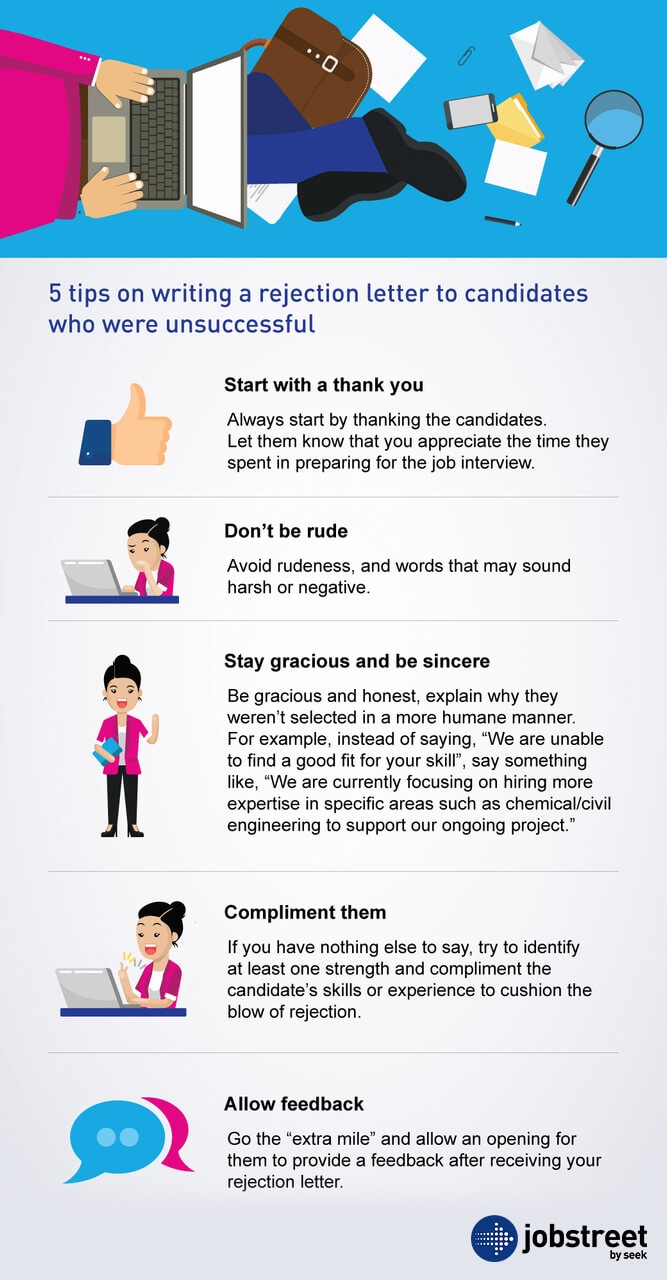
5 reasons why you should write rejection letters after interview to candidates who were unsuccessful
“We regret to inform you…”, is commonly the beginning of a post-interview rejection letter. After spending hours applying and interviewing, no candidate enjoys receiving a rejection letter, nor is it an easy task for the HR professional who writes them.
However, due to the competitive nature of the labour market, it is common to have many applications for one vacancy, leading to a high rejection rate amongst candidates. For those who were rejected, it is most often that they do not even know they have been rejected, because organisations do not practice the policy of informing the unsuccessful candidates. While the numerical barrier is understandable, there are benefits as to why you should always write a rejection letter to candidates.
Here are 5 reasons why you should write rejection letters after interview to candidates who did not make the cut:
1. It maintains your company’s good reputation
Jobseekers today are more inclined to express and share their experiences through social media platforms, especially if it is to vent out frustrations or bad experiences. A well-written and diplomatic rejection letter would likely prevent any ill feelings and leave your company name free from being smeared on social media.
2. It displays that you have common courtesy
Imagine spending so much time rehearsing and preparing for a job interview, only to receive silence after your interview. It is only common courtesy to not leave candidates in the dark, especially after they have spent so much effort in preparing for the interview. This way, candidates would feel valued and would not hesitate to apply again to your company in future.
3. It maintains your company’s professionalism
Companies with good HR systems maintain professionalism all the way and take every recruitment process seriously, including sending out rejection letters. A rejection letter not only provides a proper closure but also acknowledges and thank the candidates for their job application. Ignoring other candidates after you’ve found the “right talent” is simply rude and unprofessional.
4. It builds bridges
You may be rejecting some candidates today based on various reasons. However, remember that these candidates may improve in terms of their skills and knowledge over time therefore never sever all ties with them. It is always important to leave a lasting impression and use this chance to create a positive link with them for future hires.
5. It keeps them as your customers
Generally, candidate experience describes how candidates feel about your company after a hiring process. It affects not only their impression towards your company but their future approach towards your company brand, products or services. These candidates may not be suitable for the current open positions, however, you would definitely still want to maintain them as loyal customers.
Here are 5 tips on writing a rejection letter to candidates who were unsuccessful after an interview:

Within the sea of organisations that operate via strict standard operating procedures, especially on matters deemed trivial as informing failed candidates, it would take quite an effort to operate differently. There is not a lack of examples of how companies that operate differently are leaders in their fields. Surely albeit slowly, in the current world of a well-connected marketplace, this good practice will build upon itself to the benefit of your organisation.